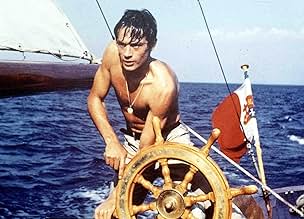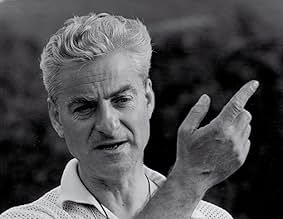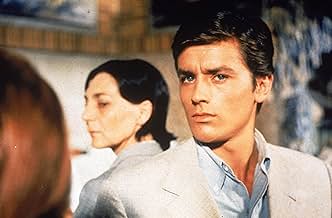Tom Ripley est un imitateur, un faussaire et un talentueux criminel. Mais il est bien plus que tout ça, même s'il l'ignore.Tom Ripley est un imitateur, un faussaire et un talentueux criminel. Mais il est bien plus que tout ça, même s'il l'ignore.Tom Ripley est un imitateur, un faussaire et un talentueux criminel. Mais il est bien plus que tout ça, même s'il l'ignore.
- Prix
- 1 victoire au total
Marie Laforêt
- Marge Duval
- (as Marie Laforet)
Billy Kearns
- Freddy Miles
- (as Bill Kearns)
René Clément
- Le serveur maladroit
- (uncredited)
Walter Grant
- Bit
- (uncredited)
Paul Muller
- Blind Man
- (uncredited)
Jacqueline Parey
- Ingrid
- (uncredited)
Romy Schneider
- Freddy's companion
- (uncredited)
Avis en vedette
Tom Ripley is the poor friend of the wealthy and arrogant Philippe Greenleaf who spends his time sailing on the Mediterranean sea's coasts of Italy in his magnificent vessel. Philippe enjoys himself by humiliating Tom whenever he can and making him feel the power that money brings. Tom envies his friend's easy life and also his pretty girlfriend Marge Duval who sails along with them and finally he kills Philippe and takes his place as a rich man by achieving the sinister and carefully plan he has developed with such purpose. Things get complicated for the killer from then on but he manages to go on with his profitable impersonation and sentimental approach to the dead man's girlfriend.
The film is skilfully handled by director René Clement and interest doesn't fall till the end, the colorful and beautiful Italian coast on the Mediterranean sea brings a great background to the story and the final sequence when Tom's perfect plan is spoiled is excellent and memorable.
Alain Delon renders one of his best performances ever as the resentful and no scruples Tom, well supported by Maurice Ronnet as Philippe and Marie Laforet as Marge. These are the characters the whole plot is about and the rest of the cast is there just for need.
Most entertaining and made with intelligence, this is thriller to see. An 8 out of 10 to me.
The film is skilfully handled by director René Clement and interest doesn't fall till the end, the colorful and beautiful Italian coast on the Mediterranean sea brings a great background to the story and the final sequence when Tom's perfect plan is spoiled is excellent and memorable.
Alain Delon renders one of his best performances ever as the resentful and no scruples Tom, well supported by Maurice Ronnet as Philippe and Marie Laforet as Marge. These are the characters the whole plot is about and the rest of the cast is there just for need.
Most entertaining and made with intelligence, this is thriller to see. An 8 out of 10 to me.
I'm fascinated by a scene at a restaurant. We get an extreme close-up of a woman who is kept out of focus while another character in the background, who is speaking and is in the center of the shot, remains in focus. Is the woman who is out of focus important or not? More to the point, was shooting it this way a good idea? It illustrates by contrast how sure-footed René Clément is most of the time. Usually there can be no debate.
I wasn't familiar with Clément's work until this film, but my God, he's good. His camera is always in some unexpected place that enhances the drama and tightens the suspense. He shares that talent with Orson Welles (meaning the Welles of "Citizen Kane" and "The Magnificent Ambersons," not, say, "Lady from Shanghai"), who also made decisions that are surprising yet invariably right.
Tom Ripley (Alain Delon) and Phillipe Greenleaf (Maurice Ronet) are lately inseparable friends. They're both idling in Europe, but on papa Greenleaf's dime. Phillipe's fiancée Marge (Marie Laforêt) feels sorry for Tom but resents his presence. Phillipe's other friend, Freddie (Billy Kearns), considers Tom Ripley a worthless moocher. But there's more to Tom Ripley, the mimic, the forger, the talented criminal improviser, than anyone, even Tom Ripley himself, can guess.
Alain Delon, with his chiseled looks and cold beauty, makes an excellent Tom Ripley. The script is brilliantly adapted from Patricia Highsmith's terrific suspense novel, "The Talented Mr. Ripley": the dialogue is always bringing the themes of duplicity, love, self-love, the nature of identity, ruthlessness and murder to the surface where they are given a brilliant sheen by Clément and his cinematographer Henri Decaë.
We're left to figure things out for ourselves, which is rare. Do we need to be told what Tom thinks of when he sees all those dead fish? When a door with a mirror swings open toward Tom, do we need to see Tom's mirror image to understand the mirror's significance? Or is it enough that we know there's a mirror next to Tom? I know what the answers would have been in Hollywood—in 1960 and now. Here, the answers are no, no and yes.
I wasn't familiar with Clément's work until this film, but my God, he's good. His camera is always in some unexpected place that enhances the drama and tightens the suspense. He shares that talent with Orson Welles (meaning the Welles of "Citizen Kane" and "The Magnificent Ambersons," not, say, "Lady from Shanghai"), who also made decisions that are surprising yet invariably right.
Tom Ripley (Alain Delon) and Phillipe Greenleaf (Maurice Ronet) are lately inseparable friends. They're both idling in Europe, but on papa Greenleaf's dime. Phillipe's fiancée Marge (Marie Laforêt) feels sorry for Tom but resents his presence. Phillipe's other friend, Freddie (Billy Kearns), considers Tom Ripley a worthless moocher. But there's more to Tom Ripley, the mimic, the forger, the talented criminal improviser, than anyone, even Tom Ripley himself, can guess.
Alain Delon, with his chiseled looks and cold beauty, makes an excellent Tom Ripley. The script is brilliantly adapted from Patricia Highsmith's terrific suspense novel, "The Talented Mr. Ripley": the dialogue is always bringing the themes of duplicity, love, self-love, the nature of identity, ruthlessness and murder to the surface where they are given a brilliant sheen by Clément and his cinematographer Henri Decaë.
We're left to figure things out for ourselves, which is rare. Do we need to be told what Tom thinks of when he sees all those dead fish? When a door with a mirror swings open toward Tom, do we need to see Tom's mirror image to understand the mirror's significance? Or is it enough that we know there's a mirror next to Tom? I know what the answers would have been in Hollywood—in 1960 and now. Here, the answers are no, no and yes.
Visually, this film could serve as a cinematic poster for a Mediterranean cruise. Cinematographer Henri Decae draws us into the film with its alluring Italian locales and gorgeous panoramic vistas. Bright, complementary hues and high color contrast translate into eye-popping reds and yellows. And, of course, there's the deep blue color of the sea, and a brilliant sunlit sky. Such is the setting for a story wherein three attractive, young adults (Tom, Philippe, and Marge) test a 3-way relationship that is far more complex than it first appears.
Indeed, trouble lurks beneath the surface (so to speak), in this "Italiano paradiso" thriller. In the first forty minutes, the psychological motivations of our three beautiful people are unclear and subject to change. It's hard to tell who is doing what to whom. Subsequent to this narrative setup, we see exactly where the story is headed. Because "Plein Soleil" is a psychodrama, casting is important. The three leads (Alain Delon, Maurice Ronet, and Marie Laforet) are all convincing in their roles.
I have not read the Highsmith novel on which the screenplay was based. So I cannot make an intertextual analysis. I do think this 1960 film is superior, for various reasons, to the more recent remake.
Adroitly directed by Rene Clement, with a buoyant musical score by Nino Rota, "Plein Soleil" is a character study of an amoral pleasure seeker whose charming personality masks the evil within. The juxtaposition of inwardly criminal intent with outwardly idyllic scenes of Italy and the Mediterranean results is an art house film that is both picturesque and suspenseful. It's a film that appeals both to our eyes and to our brains.
Indeed, trouble lurks beneath the surface (so to speak), in this "Italiano paradiso" thriller. In the first forty minutes, the psychological motivations of our three beautiful people are unclear and subject to change. It's hard to tell who is doing what to whom. Subsequent to this narrative setup, we see exactly where the story is headed. Because "Plein Soleil" is a psychodrama, casting is important. The three leads (Alain Delon, Maurice Ronet, and Marie Laforet) are all convincing in their roles.
I have not read the Highsmith novel on which the screenplay was based. So I cannot make an intertextual analysis. I do think this 1960 film is superior, for various reasons, to the more recent remake.
Adroitly directed by Rene Clement, with a buoyant musical score by Nino Rota, "Plein Soleil" is a character study of an amoral pleasure seeker whose charming personality masks the evil within. The juxtaposition of inwardly criminal intent with outwardly idyllic scenes of Italy and the Mediterranean results is an art house film that is both picturesque and suspenseful. It's a film that appeals both to our eyes and to our brains.
I saw Minghella's "The Talented Mr. Ripley" and Clement's "Purple Noon" back to back. Two entirely different movies based on exactly the same book. The differences are personal of course. Minghella has a moralistic view of his characters and their darkness must be, somehow, explained if not justified. Clement's allows the amorality of his characters to run loose. Minghella casts Matt Damon as Tom Ripley, a rather invisible actor in every way and although he's pretty good here, he's not good enough to overshadow his rival: Jude Law. Clement casts Alain Delon as Ripley and you will be with him all the way, you'll go where he goes you will turn out to be as amoral as he is - at least I did, I just wanted him to get away with it and why? Because he was Alain Delon, the Tom Ripley that, clearly, Patricia Highsmith intended. His rival is Maurice Ronet, good as he is, I didn't miss him when he left. You know why? Because I was left with the dangerous, magnetic, amoral, riveting Alain Delon. Clement allows us to see the difficulty and danger of the murders, we see them, we are there. Minghella plays it rather hurriedly. There is no real tension or horror. The most suspenseful moment is at an Opera house. The pluses on "The Talented Mr Ripley" - besides the aforementioned Jude Law - are Gwyneth Paltrow and Cate Blanchett in two beautifully written and performed parts. In "Purple Noon" Marie Laforet is left rather to her own devices. Once all said and done you can watch both films as if they weren't even related. I prefer "Purple Noon" but that's just me.
Purple Noon with Alain Delon, Maurice Ronet,and Marie Laforêt, is the chilling original to The Talented Mister Ripley. The blindingly beautiful Mediterranean background serves as a stark contrast to the lives of three spoiled and amoral characters on holiday in Italy. This original of The Talented Mr. Ripley is far different from the more recent movie, with Delon being more believable as Tom Ripley, his unbelievably handsome face hiding an evil mind, willing to do whatever it takes to trade places with Philippe Greenleaf.
There are some gratuitous shots here for 1960, and I wasn't real impressed with Maurice Ronet,who seemed too old for the part of Philippe, but on the whole, an enjoyable experience with great plot development and cinematography. The movie pulled you in like a day in the Riviera.
There are some gratuitous shots here for 1960, and I wasn't real impressed with Maurice Ronet,who seemed too old for the part of Philippe, but on the whole, an enjoyable experience with great plot development and cinematography. The movie pulled you in like a day in the Riviera.
Alain Delon's Top 10 Films, Ranked
Alain Delon's Top 10 Films, Ranked
To celebrate the life and career of Alain Delon, the actor often credited with starring in some of the greatest European films of the 1960s and '70s, we rounded up his top 10 movies, ranked by IMDb fan ratings.
Le saviez-vous
- AnecdotesAlain Delon's then girlfriend Romy Schneider appears in the very first scene as a friend of Freddie Miles.
- GaffesOnlookers are clearly visible in the background in the fish market scene.
- Citations
Philippe Greenleaf: That's why you took my bank statements?
Tom Ripley: Exactly.
Philippe Greenleaf: So you kill me and you're rich?
Tom Ripley: Don't miss a trick, do you?
Philippe Greenleaf: It seems awfully complicated. You'd be caught immediately.
Tom Ripley: No necessarily. I might not look it, but I've got lots of imagination.
- ConnexionsEdited into Spisok korabley (2008)
Meilleurs choix
Connectez-vous pour évaluer et surveiller les recommandations personnalisées
- How long is Purple Noon?Propulsé par Alexa
Détails
- Date de sortie
- Pays d’origine
- Langues
- Aussi connu sous le nom de
- Purple Noon
- Lieux de tournage
- Ischia Ponte, Ischia Island, Naples, Campanie, Italie(as Mongibello)
- sociétés de production
- Consultez plus de crédits d'entreprise sur IMDbPro
Box-office
- Brut – à l'échelle mondiale
- 108 821 $ US
- Durée1 heure 58 minutes
- Rapport de forme
- 1.66 : 1
Contribuer à cette page
Suggérer une modification ou ajouter du contenu manquant

![Regarder Trailer [English SUB]](https://m.media-amazon.com/images/M/MV5BYzkzMWVkMmEtM2I3Zi00MjE2LTkxZGYtZDYxMDFmMjBmMzM5XkEyXkFqcGdeQXRyYW5zY29kZS13b3JrZmxvdw@@._V1_QL75_UX500_CR0)































